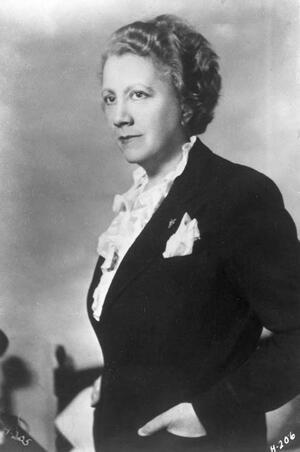Hadassah president Irma Levy Lindheim challenges American Zionist leadership
Irma Levy Lindheim served as the third president of Hadassah, the American women's Zionist organization, from 1926 to 1928. During her presidency, Hadassah was in frequent conflict with the Zionist Organization of America (ZOA), which wanted to control and dispense the funds raised from the Hadassah membership.
On March 30, 1928, Lindheim declared that the administration of the ZOA was "not an effective instrument for the achievement of world Zionist aims for the upbuilding of Palestine." In so doing, she asserted her opposition to the leadership of ZOA President Louis Lipsky. Although Lindheim was careful to note that she spoke as an individual and that Hadassah had no quarrel with the World Zionist Organization led by Chaim Weizmann, she came under attack for her comments from both ZOA leadership and other Hadassah members.
The Hadassah-ZOA conflict had roots dating back to 1918, when Hadassah (founded in 1912) first joined the umbrella organization, giving up some of its organizational independence. Seven members of the Hadassah board had been expelled in 1920 when the organization's Central Committee refused to raise money for the ZOA fund Keren Hayesod. Despite Hadassah's loss of autonomy, the organization's membership steadily increased even as general ZOA membership declined.
Following Lindheim's declaration, the national board of Hadassah voted "no confidence" in Lipsky on April 22, 1928. In retaliation, the Zionist National Executive Committee, meeting on May 27, 1928, threatened to discipline the women's organization. This conflict helped to establish Hadassah's independence from the male Zionist establishment. Lindheim, however, declined a second term as Hadassah president.
Lindheim remained an active Zionist after stepping down from the Hadassah president's chair, touring the U.S. to speak on behalf of the Zionist labor organization Histadrut and the labor Zionist groups Hashomer Hatzair and Poale Zion. In the 1930s, she parted ways with Hadassah, defining herself as further to the political left. After 1933, Lindheim split her time between Palestine/Israel and the U.S. In Israel, she helped to found several kibbutzim; in the U.S., she created educational programs to counter assimilation and to help mothers develop Jewish identity in their children. Lindheim died in California in 1978.
Sources: Jewish Women in America: An Historical Encyclopedia, pp. 571-583, 856-858; Irma Lindheim, Parallel Quest (New York, 1962); New York Times, March 31, 1928, April 1, 1928, May 28, 1928, April 11, 1978.



